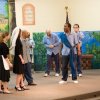Shakespeare Journeys Inside San Quentin Prison
HotThree years ago, I went to the Sundance Film Festival and attended a showing of director Hank Rogerson’s documentary, Shakespeare Behind Bars, which chronicles a group of twenty male inmates who formed a Shakespeare troupe within the walls of a minimum-medium security state prison in Kentucky. The troupe puts on a production of The Tempest, and addresses such matters as forgiveness and transformation. The affiliations between the inmates, the reasons why they spend their time behind bars, and the subject matter of the play makes sense. The documentary does a wonderful job of addressing these affiliations without imposing judgment, and without not imposing judgment. In the end, the audience is left with a sort of aerial feeling. Floating, not grounded; enamoured by its charm, yet o’erthrown by the indulgence of pardoning judgment for art’s sake.
Recently, I went to San Quentin Prison and attended the only showing of director Suraya Susana Keating’s production of Much Ado About Nothing. Shakespeare’s romantic and playful comedy carries minimal darkness and deception with the incorporation of a scheming bastard, and even this element is indubitably o’erthrown by the play’s light, witty, romantic and comedic nature. A troupe of eleven inmates are joined by Keating, ‘Michelle’, and Jane Deely (the latter two joined the troupe only months before) who portray the female roles of Beatrice, Hero, and Margaret. This project came together as the result of Leslie and Robert Currier of the Marin Shakespeare Company and their Drama Program at San Quentin; Steve Emrick, Director of Arts in Corrections; Professor Judy Breen (my grad school Shakespeare professor), and the ongoing effort of the William James Association’s thirty year commitment to the revival and survival of The Prison Art’s Project. The mission of the William James Association is to “promote work service in the arts, environment, education, and community development.”
The Prison Arts Project peaked around eight years ago, enlisting a full force of creative minds and talent to deliver theatre, creative writing, music, painting and other visual arts programs to thirty-three California institutions in an attempt to bring the magic of the arts to, and make a difference in the lives of, incarcerated men and women. In 2003, California’s projected $14 billion budget crisis slashed a bevy of state services and programs, including funding for the Prison Arts Project, which has only survived the past five years thanks to private foundations and individual funding.
So why even have such a program? Why is it important on this day, my day at San Quentin Prison, and for these eleven men's lives behind bars? According to some studies, ninety percent of California State inmates will be released into the community again. Inmates involved in the Prison Arts Project “have 75% fewer disciplinary actions and a recidivism rate that is 27% lower than the general prison population.” These numbers are impressive, and after listening to the inmates/actors discuss their experiences with this program, with this play, and with one another, I would tend to agree that the AIC program is gloriously beneficial for both inmates and the community as a whole.
So what of the play? The play’s the thing, right? After seven months of preparation, weekly classes, and for some of these actors, hundreds of hours of line work while walking the yard, these men pulled together a solid and at times great full-length production of Much Ado About Nothing, staged in the Prison Chapel. It and they are deserving of our accolades. Keating, an actress for the past ten years and registered drama therapist for the past six, has worked in the prison system since 2001, starting her work in San Quentin in 2006. Last year, Keating helped her actors deliver a one-hour production of Macbeth. John O. Neblett, who played King Duncan in Macbeth and Benedick in this year’s production of Much Ado explains,
"Last year’s production of Macbeth was truncated so much that it was really more a presentation of Shakespeare. That’s what got the other guys to sign up. It’s the fact that we did that job, and they’re like, 'We want to do that!’ It was a building (block) for us. When we connect with values in a negative way, bad things happen. Are all these things happening in Shakespeare’s time still relevant today? Well, they’re relevant for us to look at and see that in some cases, there were negative values."
Neblett goes on to relate his thoughts to a recent case involving a woman in Richmond, CA who was attacked. Two men committed an act of revenge on the perpetrator, and now have murder raps. He then acknowledges that their value system is warped, and they are now wracked with consequences for their actions.
John O. Neblett is 44 years old. He obtained his AA degree in 1988 while incarcerated in Salinas, CA, and he looks forward to achieving his BA in English after he paroles. He has studied all of Shakespeare’s sonnets; reads Marlowe and Milton; writes his own poetry, and would someday like to learn how to play the lute. John pled guilty to a count of 2nd degree murder over two decades ago. In consequence, he is sentenced to a life behind bars.
Michael B. Willis, who stands an estimated 5’5” on a good day, plays the constable, Dogberry, in this production. In preparing for his role, Willis first looked without in order to find the character within.
"I realized (through watching) Peter Sellers and all these other comedians, and even someone like Columbo, that Dogberry is a prototype. Once I figured that out it became a little easier, and I’m like, okay, I’m crazy enough to pull this off."
“Pull it off” is an understatement. Willis proves a better actor than a good lot of Bay Area actors, incorporating a slapstick side walk to his step, as well as impeccable comedic timing. When asked why the AIC program should continue, Willis explains:
"Because Shakespeare was a student of life. He understood human nature. He took a man who was 43½ years old who knew very little about life, in general. I was a walking self-destruction site, and I’m growing up today. I went back to school; I’ve gotten my GED; I’m halfway through the college program. I attend programs which are helpful to my self-development. I tutor, and do you know what? I love who I am today. I’m not ready to be out of here, I’m prepared. It’s because William Shakespeare, the Arts in Corrections program, Marin Shakespeare Company, and these guys over here, that’s why."
Michael is incarcerated under the Three Strikes Law for burglary. He is sentenced to spend the rest of his life behind bars. He has a daughter who turned twelve just a week before this production opened. When he portrayed Malcolm in last year’s production of Macbeth, she was only ten. Michael is a writer. His short stories are featured in two anthologies called “Brothers in Pen,” available at www.lulu.com. All proceeds go toward the creative writing program offered through the AIC program.
Don Pedro is by far the most intriguing character in this play. He is a friend to both Benedick and Claudio, but his motivations are sometimes helpful and sometimes hazy. He is skilled in the art of manipulation, but not to the point of being a villain like his half-brother, Don John. Don Pedro’s elusive behavior throughout the play leaves him a question to be answered, much like the actor who portrays him.
“Luke” is a thespian and by far the most skilled on this stage. His mother, who passed away while Luke was doing a portion of his time at Donovan State Prison in San Diego in 2005, the same year his sister died, was a teacher and presented Shakespeare and other literature to her son as “required reading.” Luke has been within the California State prison system since 1994, and offered me a foot of his now fourteen year journey. He started in what he calls “battle gyms” or “rock and roll agencies.” These are the level four maximum security prisons such as Pelican Bay and Folsom, and they house inmates at the highest level of security. They are called “battle gyms” for a reason. His first day in prison, Luke saw a man get stabbed. At his next stop, he got into a cell fight because his “cellie,” a white man, didn’t want Luke in his cell.
"I ended up defending myself to the point where he backed away. I don’t want to say I beat him down, but that’s what happened. Those instances carry on in prison. (If) they know you’re a weak person in prison you become prey. I’ve never been anyone’s prey. I’m not a predator. I just believe that everything outside of my arms (Luke outstretches his arms to a span of about six feet, extending from his 6’0” or so prominent stature) belongs to you. Everything in my reach belongs to me. So if you touch me, I have to give you what you want. And… uh… I don’t even like to talk about that… Went from there to Lancaster in Riverside. From there I went to Donovan in San Diego. I didn’t even think I was going to be sent here. I went to the annual meeting where they ship everyone out, and I was told ‘you can either stay here or go to another prison,’ and I just thought, oh, I know I’m not gonna get to San Quentin. This place, it’s kinda like a prestige place where you just do your time."
I asked, Why is it a “prestige place?” And what do you mean by "just doing your time?"
"Here, you can just do your time. You don’t have to “suit up.” And by “suit up” I literally mean put newspapers around you so if something happens (Luke leans in a little and lowers his voice), if they try to stab you you’re guarded. Here, you can actually do your time. You can go to school; you can get into programs that give you the coping skills where if you do step outside of prison, you’re better prepared to say, ‘Hey wait a minute, I’ve seen that person’s spirit, maybe in a different body, and I’ve seen that negative spirit. It’s just wearing a different coat. I know how to navigate around that.' I’ve been to the battle gyms and I’ve survived. Here at San Quentin, there are programs that give us a chance to regain our humanity; to peel back the layers of who we are as men, and to know maybe I am worth something. I know I made a mistake, but now is a new day and I want to better myself. Everyone knows we have to wear a face inside the institution. We have to wear a face for the guards; we have to wear a face for everyone else. But we have Samoans, we have black men, we have Jews up here; we have Christians up here (on stage). We’re all getting along; we’re all doing right. This program’s given us everything, because now we can look back after we get out of here. After this vacation’s over, we can look at our children or our grandchildren and say ‘Hey, we made history here.’ Irregardless (sic) as to what they think of us out there, we made history."
Luke wears a wooden Star of David tightly anchored around his neck. He misses his mother, the thought of whom weakens his voice with tears, “so much…so much…” He lives in the present, but also makes plans for his future, for getting out, for seeing his grandmother again and his father, who he met only once when he was thirty. He plans to take two weeks off and get his legs back because he doesn’t know what it’s like out there anymore. He will also continue to act, and if he does get out, I, for one, will attend his performances because he is just that good.
Luke told me he was convicted of burglary, arson, attempted kidnapping and murder, and that he did not plead guilty to murder. He has spent nearly every day of the past fourteen years in the library reading law books, has filed seven DNA motions, and has finally been appointed a DNA attorney to potentially investigate the hairs found in the victim’s hands. Luke is sentenced to life in prison.
Perhaps the most convincing words defending the need for the Prison Arts Project come from a man named “Bone.” In a kind of poetic way, Bone (aka Troy Williams), who portrays Claudio in this production, introduces himself:
"My nickname is ‘Bone,’ right? So whatever you imagine about a dude named Bone doin’ Shakespeare, I probably ai’nt one of ‘em. It’s like, it’s about growth. When you go into a character, you learn about the emotional content of who you are as an individual. You also are able to look beyond peer pressure. Once again, a dude named Bone sittin’ up here on stage at San Quentin State Prison doin’ Shakespeare. I’m sure that doesn’t fit many images that come across a person’s mind about a dude named Bone."
True, but perhaps if you knew the derivation of the name, you’d think differently. Where Troy was growing up in Chicago, people were given nicknames that were opposite their personality. When Troy was young, he was a “pudgy little kid. I would move slow all the time; I wouldn’t rush nowhere.” His aunties started teasing him by calling him “Turbo.” Troy couldn’t yet pronounce the word, so he said “Tay-bo,” sorta like T-Bone. Over time, that turned into “Bone.”
Bone is well aware of the swinging door effect of our prison system. Statistics show that ninety percent of inmates will return to our communities, but how many will reenter the system? With this in mind, Bone makes a strong case for the continuation of support for the Prison Arts Project.
"After spending so many years in a confined place where there was no interaction, and it’s like you had to hide your emotions, look tough, don’t let people see the weak side of you. Please and thank you is considered a weakness. Imagine living in that for nine/ten years and being pressed back into society. In here, being involved in programs like this, you get to use your creativity. You get to be who you are, to be who you want to be. To work toward your goals in life, and not just stuck up on the shelf. It’s a major difference. You can’t sit a guy in an environment where he doesn’t deal with his emotions. You can’t sit a guy in a place like that and then thrust him in the streets with $200. It’s not gonna work ‘cause he’s gonna revert to what he knows best that got him in prison. To feel. That’s the key word. To feel. To be here, to deal with your emotions, especially when it’s Shakespeare-related. You really have to work to understand what are these words saying. You delve into the emotions and you control that emotion through your acting. So when it comes time to deal with that in real life, you’ve had some practice."
It seems as though Much Ado About Nothing is not necessarily the “thing” here, but one of the many destinations for these eleven men. I’d bargain that the Shakespearean journey is more the “thing.” There’s a sense in Shakespeare’s plays that a journey is symbolic of transformation in some way. Hamlet’s journey across his sea of troubles returns a man of “readiness” and “action.” In The Tempest, the play begins with Prospero recounting his forced journey across the sea, and ends with his brave new journey back, unarmed and willingly o’erthrown. These eleven inmates, ten of them “lifers,” broke many barriers and crossed many lines in order to act together on this stage—racial lines, social lines, religious and emotional lines—and in doing so, they were able to move forward with their own personal journeys and into a brave new world illuminated by feeling and understanding through expression and art. This play and this program are about preparing these men for the rest of their lives, no matter where that time is spent.
For more information on the William James Association and the Prison Arts Project, visit www.williamjamesassociation.org.














































